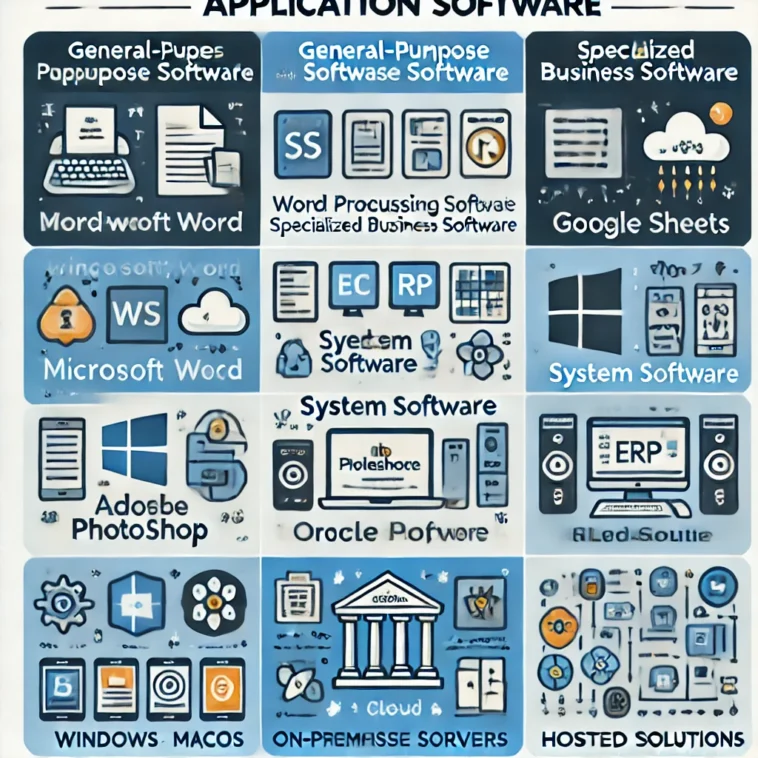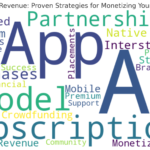In today’s digital age, businesses rely heavily on various types of application software to streamline operations, improve efficiency, and enhance productivity. Understanding the different categories of application software and their specific uses can help businesses choose the right tools to meet their unique needs. This blog post explores the importance of different types of application software and provides insights into their practical applications.
General-Purpose Software
1. Word Processing Software:
- Examples: Microsoft Word, Google Docs
- Uses: Word processing software is essential for creating, editing, and formatting text documents. These tools are used for drafting reports, creating proposals, and writing correspondence, making them indispensable in both educational and professional settings.
2. Spreadsheet Software:
- Examples: Microsoft Excel, Google Sheets
- Uses: Spreadsheet software is crucial for organizing, analyzing, and visualizing data. Businesses use these tools for financial modeling, budgeting, and data analysis, which helps in making informed decisions based on accurate data.
3. Multimedia Software:
- Examples: Adobe Photoshop, VLC Media Player
- Uses: Multimedia software includes tools for creating, editing, and playing multimedia content such as images, videos, and audio. These tools are vital for marketing, advertising, and content creation, enabling businesses to produce high-quality visual and audio materials.
Specialized Business Software
1. Customer Relationship Management (CRM) Software:
- Examples: Salesforce, HubSpot CRM
- Uses: CRM software helps businesses manage customer interactions, track sales, and support marketing efforts. It centralizes customer information and automates routine tasks, enhancing customer relationships and driving sales growth.
2. Enterprise Resource Planning (ERP) Software:
- Examples: SAP ERP, Oracle ERP Cloud
- Uses: ERP software integrates various business processes into a single unified system, including finance, HR, supply chain, and manufacturing. This integration improves efficiency, data accuracy, and decision-making by providing a comprehensive view of business operations.
System Software vs. Application Software
Understanding the difference between system software and application software is crucial for businesses. System software, such as operating systems and utility programs, manages the hardware and basic functions of a computer. Examples include Windows, macOS, and Linux. Application software, on the other hand, performs specific tasks for users and runs on top of system software.
System software provides the foundation for application software. For example, the operating system manages system resources and provides a user interface, while utility programs perform maintenance tasks like virus scanning and disk cleanup. Without system software, application software would not function effectively.
On-Premise vs. Hosted Solutions
Businesses must also decide between on-premise and hosted (cloud-based) solutions for their software needs.
- On-Premise Software: Installed locally on a company’s servers, providing greater control and security. However, it requires significant upfront investment and ongoing maintenance.
- Hosted Solutions: Hosted on remote servers and accessed via the internet, offering flexibility, scalability, and cost savings. Cloud-based solutions reduce the need for in-house IT infrastructure and support.
On-premise software is ideal for organizations that require full control over their software and data. It offers enhanced security and customization options but involves higher costs for hardware, maintenance, and IT support. Hosted solutions, on the other hand, offer cost-effective and scalable options with minimal upfront investment. They are ideal for businesses looking to reduce IT overhead and benefit from the latest software updates and features without the hassle of managing hardware and infrastructure.
Conclusion
Choosing the right type of application software is essential for businesses to enhance productivity, streamline operations, and achieve their strategic goals. By understanding the different categories of software and their specific uses, businesses can make informed decisions that align with their unique needs.
For a more detailed exploration, visit the full article: Types of Application Software: Examples & Uses.
By leveraging the right application software, businesses can optimize their workflows, improve efficiency, and drive growth in the digital age.




Comments
0 comments